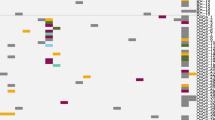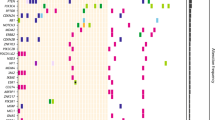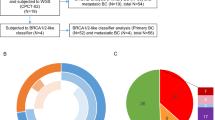Abstract
Introduction
Defects in the homologous recombination repair (HRR) pathway can include mutations in BRCA1 and BRCA2 (BRCAm) and other HRR genes (HRRm). These mutations are associated with a homologous recombination deficiency (HRD) phenotype. We evaluated testing journey and treatment patterns by BRCAm, HRRm, and HRD status in a real-world dataset.
Methods
Deidentified data for patients who had undergone comprehensive genomic profiling using FoundationOne®CDx were collected through December 31, 2020, from a real-world multi-tumor clinico-genomic database (CGDB) capturing data from clinics in the United States. Patients eligible for inclusion in this analysis had a confirmed diagnosis with advanced or metastatic disease between January 1, 2018, and December 31, 2019, for 1 of 15 solid tumor types. Objectives were to evaluate patient treatment patterns by BRCAm, HRRm, and HRD status and to describe the timing of when (throughout disease course) comprehensive genomic profiling was performed.
Results
Among 9457 patients included in the overall population with evaluable biomarker status, 7856 (83.1%) received ≥ 1 systemic therapy. Among the 7856 patients who received systemic therapy, 2324 (30.0%) underwent testing before first-line therapy, 4114 (52.4%) were tested after receiving first-line therapy and before receiving subsequent therapy (if any), 970 (12.3%) were tested after second-line therapy and before receiving subsequent therapy (if any), and 447 (5.7%) patients underwent testing after receiving third-line therapy. A higher proportion of patients with BRCAm, HRRm, or HRD-positive status were treated with poly(ADP-ribose) polymerase (PARP) inhibitors across all lines of therapy. There was no evidence of a meaningful difference in the proportion of patients who received other treatment (including chemotherapy and immunotherapy) by BRCAm, HRRm, or HRD status.
Conclusion
The majority of patients from this real-world dataset underwent FoundationOne®CDx testing after initiation of first-line treatment. Testing appeared to influence treatment patterns, with a higher proportion of patients with BRCAm, HRRm, and HRD-positive disease receiving PARP inhibitors.






Similar content being viewed by others
Data Availability
The data that support the findings of this study originated by Flatiron Health, Inc. and Foundation Medicine, Inc. These de-identified data may be made available upon request, and are subject to a license agreement with Flatiron Health and Foundation Medicine; interested researchers should contact < cgdb-fmi@flatiron.com > and < dataaccess@flatiron.com > to determine licensing terms.
References
Stewart MD, Merino Vega D, Arend RC, et al. Homologous recombination deficiency: concepts, definitions, and assays. Oncologist. 2022;27:167–74.
Li X, Heyer WD. Homologous recombination in DNA repair and DNA damage tolerance. Cell Res. 2008;18:99–113.
Mersch J, Jackson MA, Park M, et al. Cancers associated with BRCA1 and BRCA2 mutations other than breast and ovarian. Cancer. 2015;121:269–75.
Heeke AL, Pishvaian MJ, Lynce F, et al. Prevalence of homologous recombination-related gene mutations across multiple cancer types. JCO Precis Oncol. 2018;2018:PO.17.00286.
Moore K, Colombo N, Scambia G, et al. Maintenance olaparib in patients with newly diagnosed advanced ovarian cancer. N Engl J Med. 2018;379:2495–505.
Robson M, Im SA, Senkus E, et al. Olaparib for metastatic breast cancer in patients with a germline BRCA mutation. N Engl J Med. 2017;377:523–33.
Golan T, Hammel P, Reni M, et al. Maintenance olaparib for germline BRCA-mutated metastatic pancreatic cancer. N Engl J Med. 2019;381:317–27.
Abida W, Patnaik A, Campbell D, et al. Rucaparib in men with metastatic castration-resistant prostate cancer harboring a BRCA1 or BRCA2 gene alteration. J Clin Oncol. 2020;38:3763–72.
Tutt ANJ, Garber JE, Kaufman B, et al. Adjuvant olaparib for patients with BRCA1- or BRCA2-mutated breast cancer. N Engl J Med. 2021;384:2394–405.
Fizazi K, Piulats JM, Reaume MN, et al. Rucaparib or physician’s choice in metastatic prostate cancer. N Engl J Med. 2023;388:719–32.
Litton JK, Rugo HS, Ettl J, et al. Talazoparib in patients with advanced breast cancer and a germline BRCA mutation. N Engl J Med. 2018;379:753–63.
de Bono J, Mateo J, Fizazi K, et al. Olaparib for metastatic castration-resistant prostate cancer. N Engl J Med. 2020;382:2091–102.
Gonzalez-Martin A, Pothuri B, Vergote I, et al. Niraparib in patients with newly diagnosed advanced ovarian cancer. N Engl J Med. 2019;381:2391–402.
Ray-Coquard I, Pautier P, Pignata S, et al. Olaparib plus bevacizumab as first-line maintenance in ovarian cancer. N Engl J Med. 2019;381:2416–28.
Mei P, Freitag CE, Wei L, Zhang Y, Parwani AV, Li Z. High tumor mutation burden is associated with DNA damage repair gene mutation in breast carcinoma. Diagn Pathol. 2020;15:1–7.
Marabelle A, Fakih M, Lopez J, et al. Association of tumour mutational burden with outcomes in patients with advanced solid tumours treated with pembrolizumab: prospective biomarker analysis of the multicohort, open-label, phase 2 KEYNOTE-158 study. Lancet Oncol. 2020;21:1353–65.
Pellegrino B, Musolino A, Llop-Guevara A, et al. Homologous recombination repair deficiency and the immune response in breast cancer: a literature review. Transl Oncol. 2020;13:410–22.
You Z, Lv M, He X, et al. Homologous recombination repair gene mutations as a predictive biomarker for immunotherapy in patients with advanced melanoma. Front Immunol. 2022;13: 871756.
Harter P, Trillsch F, Okamoto A, et al. Durvalumab with paclitaxel/carboplatin (PC) and bevacizumab (bev), followed by maintenance durvalumab, bev, and olaparib in patients (pts) with newly diagnosed advanced ovarian cancer (AOC) without a tumor BRCA1/2 mutation (non-tBRCAm): results from the randomized, placebo (pbo)-controlled phase III DUO-O trial. J Clin Oncol. 2023;31:LBA5506.
Fumet JD, Limagne E, Thibaudin M, et al. Precision medicine phase II study evaluating the efficacy of a double immunotherapy by durvalumab and tremelimumab combined with olaparib in patients with solid cancers and carriers of homologous recombination repair genes mutation in response or stable after olaparib treatment. BMC Cancer. 2020;20:748.
Maio M, Shapira-Frommer R, Yap TA, et al. Olaparib plus pembrolizumab in patients with previously treated advanced solid tumors with homologous recombination repair mutation (HRRm) and/or homologous recombination deficiency (HRD): initial results of the phase 2 KEYLYNK-007 study. Cancer Res. 2021;81:CT178.
Hoppe MM, Sundar R, Tan DSP, Jeyasekharan AD. Biomarkers for homologous recombination deficiency in cancer. J Natl Cancer Inst. 2018;110:704–13.
Imyanitov E, Sokolenko A. Integrative genomic tests in clinical oncology. Int J Mol Sci. 2022;23:13129.
Dotolo S, Esposito Abate R, Roma C, et al. Bioinformatics: from NGS data to biological complexity in variant detection and oncological clinical practice. Biomedicines. 2022;10:2074.
US Food and Drug Administration. Summary of Safety and Effectiveness Data (SSED). FoundationOne®CDx. https://www.accessdata.fda.gov/cdrh_docs/pdf17/P170019S016B.pdf. Accessed 16 Sep 2020.
Milbury CA, Creeden J, Yip WK, et al. Clinical and analytical validation of FoundationOne®CDx, a comprehensive genomic profiling assay for solid tumors. PLoS ONE. 2022;17: e0264138.
Frampton GM, Fichtenholtz A, Otto GA, et al. Development and validation of a clinical cancer genomic profiling test based on massively parallel DNA sequencing. Nat Biotechnol. 2013;31:1023–31.
FoundationOne CDx™. FoundationOne CDx™ Technical Information. https://www.accessdata.fda.gov/cdrh_docs/pdf17/P170019C.pdf. Accessed 13 June 2023.
Singal G, Miller PG, Agarwala V, et al. Association of patient characteristics and tumor genomics with clinical outcomes among patients with non-small cell lung cancer using a clinicogenomic database. JAMA. 2019;321:1391–9.
Sokol ES, Pavlick D, Khiabanian H, et al. Pan-cancer analysis of BRCA1 and BRCA2 genomic alterations and their association with genomic instability as measured by genome-wide loss of heterozygosity. JCO Precis Oncol. 2020;4:442–65.
Coleman RL, Oza AM, Lorusso D, et al. Rucaparib maintenance treatment for recurrent ovarian carcinoma after response to platinum therapy (ARIEL3): a randomised, double-blind, placebo-controlled, phase 3 trial. Lancet. 2017;390:1949–61.
Dalurzo ML, Aviles-Salas A, Soares FA, et al. Testing for EGFR mutations and ALK rearrangements in advanced non-small-cell lung cancer: considerations for countries in emerging markets. Onco Targets Ther. 2021;14:4671–92.
Giaquinto AN, Miller KD, Tossas KY, Winn RA, Jemal A, Siegel RL. Cancer statistics for African American/Black people 2022. CA Cancer J Clin. 2022;72:202–29.
Saini KS, Twelves C. Determining lines of therapy in patients with solid cancers: a proposed new systematic and comprehensive framework. Br J Cancer. 2021;125:155–63.
Motta R, Cabezas-Camarero S, Torres-Mattos C, et al. Immunotherapy in microsatellite instability metastatic colorectal cancer: current status and future perspectives. J Clin Transl Res. 2021;7:511–22.
Medical Writing And Editorial Assistance.
Medical writing assistance was provided by Ali Hassan, PhD, of ICON plc (Blue Bell, PA, USA). This assistance was funded by MSD.
Funding
Funding for this research and publication, including the journal’s Rapid Service Fee, were provided by Merck Sharp & Dohme LLC, a subsidiary of Merck & Co., Inc., Rahway, NJ, USA.
Author information
Authors and Affiliations
Contributions
Changxia Shao: study concept, design, or planning of the study; acquisition of the data; interpretation of the results; critically reviewing the manuscript. Yixin Ren: planning of the study; analysis of the data; interpretation of the results; critically reviewing the manuscript. Heng Zhou: planning of the study; analysis of the data; interpretation of the results; critically reviewing the manuscript. Liam C. Lee: study concept, design, or planning of the study; acquisition of the data; interpretation of the results; critically reviewing the manuscript. Cai Chen: planning of the study; analysis of the data; interpretation of the results; critically reviewing the manuscript. Elisha J. Dettman: study concept, design, or planning of the study; acquisition of the data; interpretation of the results; critically reviewing the manuscript. Razvan Cristescu: planning of the study; analysis of the data; interpretation of the results; critically reviewing the manuscript. Alexander Gozman: study concept, design, or planning of the study; acquisition of the data; interpretation of the results; critically reviewing the manuscript. Fan Jin: study concept, design, or planning of the study; acquisition of the data; interpretation of the results; critically reviewing the manuscript. Wei Zhou: study concept, design, or planning of the study; acquisition of the data; interpretation of the results; critically reviewing the manuscript.
Corresponding author
Ethics declarations
Conflict of Interest
Changxia Shao, Yixin Ren, Heng Zhou, Cai Chen, Elisha J. Dettman, Razvan Cristescu, Alexander Gozman, and Fan Jin are employees of Merck Sharp & Dohme LLC, a subsidiary of Merck & Co., Inc., Rahway, NJ, USA, and own stock in Merck & Co., Inc., Rahway, NJ, USA. Wei Zhou and Liam C. Lee are former employees of Merck Sharp & Dohme LLC, a subsidiary of Merck & Co., Inc., Rahway, NJ, USA. Wei Zhou is currently an employee of Eli Lilly and Company, Indianapolis, IN, USA. Liam C. Lee is currently an employee of AstraZeneca Pharmaceuticals, One MedImmune Way, Gaithersburg, MD, USA.
Ethical Approval
The IRB approval for the Flatiron Health CGDB was obtained by Flatiron Health prior to the present study. The IRB of WCG IRB (Princeton, NJ, USA) gave ethical approval for the study protocol based on the Flatiron Health CGDB, and included a waiver of informed consent (approval ID 420180044).
Additional information
Liam C. Lee and Wei Zhou were affiliated with Merck & Co., Inc. at time of study.
Supplementary Information
Below is the link to the electronic supplementary material.
Rights and permissions
Springer Nature or its licensor (e.g. a society or other partner) holds exclusive rights to this article under a publishing agreement with the author(s) or other rightsholder(s); author self-archiving of the accepted manuscript version of this article is solely governed by the terms of such publishing agreement and applicable law.
About this article
Cite this article
Shao, C., Ren, Y., Zhou, H. et al. Biomarker Testing Journey Among Patients with Advanced Solid Tumors and Treatment Patterns by Homologous Recombination Repair Status: A Clinico-Genomic Database Study. Adv Ther 41, 759–776 (2024). https://doi.org/10.1007/s12325-023-02734-4
Received:
Accepted:
Published:
Issue Date:
DOI: https://doi.org/10.1007/s12325-023-02734-4




